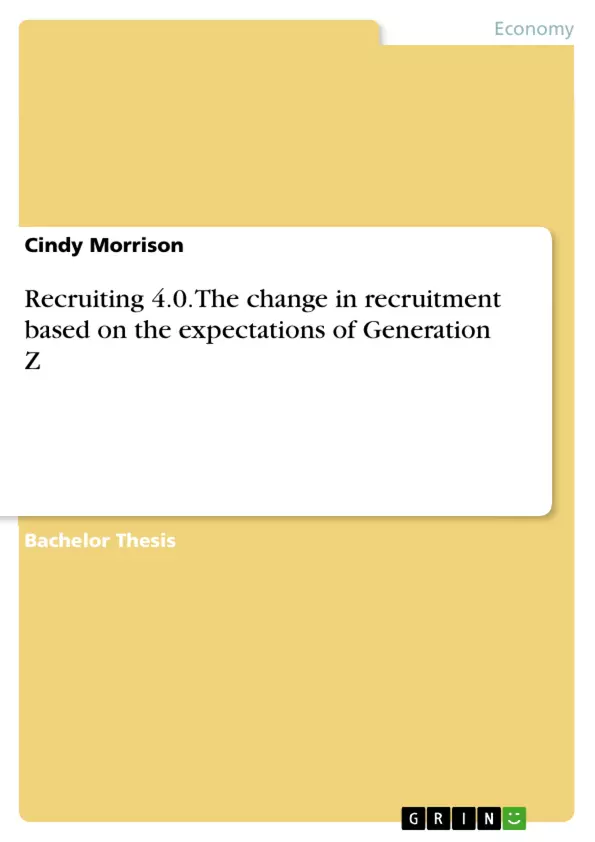Digitization and automation in companies are changing the world of work significantly. This also affects recruiting processes. The aim of this paper is to question previous recruitment measures and to develop sensible recommendations for action for Recruiting 4.0 so that the demands of Generation Z can be incorporated.
Demographic change poses major challenges for companies because the changes in recent decades have also led to a shift in generational values. With Generation Z, a new generation is entering the labor market. This generation has a clear idea of how its working world should be shaped. This generation's expectations of their future workplace are shaped by their observations of the older generations around them.
However, their expectations contradict previous developments in the world of work. In addition, companies and Generation Z have conflicting visions of the future about how work should be shaped. Companies demand more flexibility, but Generation Z wants security, clear structures and sets limits. In order to convince Generation Z as an employer, future recruitment measures must be redesigned. Companies are forced to deal with Generation Z's expectations of the world of work and to further develop existing measures and strategies in HR work in order to win over the scarce talent.
Table of Contents
- 1 Introduction
- 1.1 Problem statement
- 1.2 Objective
- 1.3 Structure of the paper
- 2 Change in the world of work
- 2.1 First and Second Industrial Revolutions
- 2.2 Digital Revolution - Working World 4.0
- 2.3 Demographic change
- 2.3.1 Historical development
- 2.3.2 Shortage of skilled workers – the "War of Talent"
- 3 The transformation of recruitment
- 3.1 Recruitment
- 3.1.1 Classic recruitment
- 3.1.2 Limits of classic recruitment
- 3.2 Personnel marketing and employer branding
- 3.3 E-Recruiting in the Age of Digitalization
- 3.3.1 Opportunities of e-Recruiting
- 3.3.2 Limits of e-Recruiting
- 4 Changing values from Generation X to Generation Z
- 4.1 The generational concept
- 4.2 Characteristics: Generation X - "Digital Immigrants"
- 4.2.1 Characteristics, defining events and values
- 4.2.2 Requirements for the world of work
- 4.3 Characteristics: Generation Y - "Digital Natives"
- 4.3.1 Characteristics, defining events and values
- 4.3.2 Requirements for the world of work
- 4.4 Characteristics: Generation Z – "Digital Natives 2.0"
- 4.4.1 Characteristics, defining events and values
- 4.4.2 Requirements for the world of work
- 5 Challenges for Recruiting 4.0
- 5.1 Analysis of the current situation
- 5.2 Determination of target group-oriented requirements
- 5.2.1 Current studies in recruiting
- 5.2.2 Social Media / Social Networks
- 5.2.3 Artificial Intelligence / Chatbots
- 5.2.4 Mobile Recruiting: Application via app / one-click application
- 5.2.5 Employer Review Portals
- 5.3 Development of new strategies
- 6 Critical consideration and conclusion
Objectives and Key Themes
This bachelor thesis critically examines the evolution of recruitment practices in light of the expectations of Generation Z. The goal is to analyze how the changing world of work, particularly the digital revolution and demographic shifts, are transforming recruitment strategies.
- The impact of the digital revolution on the workplace and recruitment
- The evolving values and expectations of Generation Z
- The challenges and opportunities presented by new technologies in recruitment
- The need for innovative strategies to attract and retain talent in a competitive job market
- The development of "Recruiting 4.0" and its implications for future recruitment practices.
Chapter Summaries
- Chapter 1 introduces the problem statement, objective, and structure of the thesis. It sets the stage for analyzing the changing landscape of recruitment.
- Chapter 2 explores the impact of technological advancements and demographic shifts on the world of work, laying the foundation for understanding the context of "Recruiting 4.0".
- Chapter 3 examines the transformation of recruitment practices, highlighting the shift from traditional methods to new technologies and digital approaches.
- Chapter 4 delves into the changing values and expectations of different generations, focusing on Generation Z and their unique requirements in the workplace.
- Chapter 5 analyzes the challenges faced by recruiters in the era of "Recruiting 4.0" and explores various technological solutions and strategies to address these challenges.
Keywords
The core keywords and focus topics include "Recruiting 4.0", "Generation Z", "Digital Revolution", "Demographic Change", "E-Recruiting", "Employer Branding", "Social Media", "Artificial Intelligence", "Mobile Recruiting", and "Talent Acquisition". These keywords reflect the central themes of the work and highlight the key areas of research and analysis.
Frequently Asked Questions
What is "Recruiting 4.0"?
Recruiting 4.0 refers to the modernization of recruitment processes through digitalization, automation, and the use of technologies like AI and social media to find talent.
What are the main expectations of Generation Z in the workplace?
Generation Z seeks security, clear structures, and a healthy work-life balance, often setting firmer boundaries than previous generations.
How does demographic change affect recruitment?
Demographic shifts have led to a shortage of skilled workers, creating a "War for Talent" where companies must compete more aggressively to attract young professionals.
What is the difference between "Digital Immigrants" and "Digital Natives"?
Generation X are "Digital Immigrants" who learned technology later, while Generations Y and Z are "Digital Natives" who grew up with digital tools as a primary part of life.
What role do chatbots and AI play in modern recruiting?
They are used to automate initial communication, answer candidate questions quickly, and streamline the application process for a better candidate experience.
- Citar trabajo
- Cindy Morrison (Autor), 2019, Recruiting 4.0. The change in recruitment based on the expectations of Generation Z, Múnich, GRIN Verlag, https://www.grin.com/document/1185315



